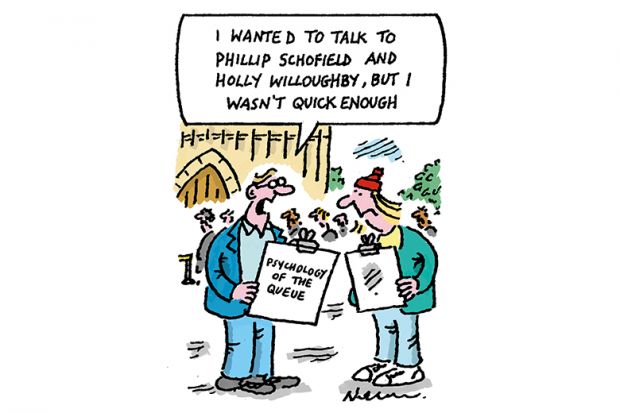
For thousands of mourners, the late Queen Elizabeth II’s lying-in-state was an opportunity to say goodbye to Britain’s longest reigning monarch. For crowd psychologists, another type of opportunity presented itself. In mid-September more than a dozen researchers from institutions including St Andrews, Edinburgh, Dundee, Sussex and Keele visited gatherings around the country for a look into the “dynamics and behaviour of the crowds who have turned out to mark the passing of the Queen and the accession of a king”, according to The Times. Stephen Reicher, from St Andrews’ School of Psychology and Neuroscience, described the experience as a natural part of scholarship: “We’re academics, we collect data and publish papers – it’s what we do.” According to the professor, mourners have the benefit of being easier to study than another of his subjects, rioters: “One problem when studying a riot is it’s hard to ask people to ‘put down that brick for a moment so I can interview you’,” he noted.
As world leaders will know, threatening the nuclear option is a last resort. A 21-year-old student learned this lesson the hard way when she took a trip to the Salt Lake County Jail for “making a threat of terrorism” after apparently suggesting that she would detonate the University of Utah’s nuclear reactor if its football team didn’t win against their San Diego State University rivals. The student was the second to be arrested on similar charges within weeks, local news site KSL reported. Police said that the student “is aware of where the reactor is located and attends class in the same building where the reactor is housed”. The student later said her comments were a joke, but the university was unamused. In a statement, administrators said the university has a “zero-tolerance policy for these kinds of threats”. Happily, as it turned out, no mushroom clouds were warranted; Utah won the football game 35-7.
A senior academic’s CV can look daunting. For the mere mortals among us, it helps when the rows of impressive accomplishments come with a hefty dose of humour, as one Chinese physicist recently discovered. Hu Jinniu, a professor at the School of Physics at Nankai University, went viral for his tongue-in-cheek CV, the South China Morning Post reported. The professor, who jokingly attributes his time as a visiting scholar to his inability to “find a real job”, found he had plenty of online fans. Next to the entry for his PhD, he wrote of his time as a doctoral student, “don’t ask me what I experienced during this period”. In his more recent work, he said he’d been publishing papers on astrophysics because he “found it’s easier to muddle through astrophysics than muddling through nuclear physics”. If academia doesn’t work out, he has a good foundation for a career in comedy.
And so we return to that magical time of year, when the great and the good of science assemble to poke fun at the esoterica of contemporary research. The Guardian’s write-up of this year’s Ig Nobel Prizes opens with the revelation that the bigger the knob, the more fingers are required to turn it. A team led by Gen Matsuzaki, an industrial design researcher at the Chiba Institute of Technology, grabbed the engineering gong for their 1999 paper on the “rotary control of columnar knobs”. Accepting the prize, which celebrates the most laughable corners of the scientific literature, Professor Matsuzaki said he won for “focusing on a problem that no one cares about”, and gamely added that there was “no way of knowing” if the work had influenced knob design, because he had since moved on to studying bag handles and umbrella grips, which surely deserves its own award for honest appraisal of impact.
As the biggest city in Scotland, you would think Glasgow had the space to house university students. Not so. A second-year business management and politics student at the University of Glasgow told the BBC he had unsuccessfully applied to “hundreds” of flats since February. Kirshen Chadwick-Patel said he had spent the first two weeks of the winter semester sleeping at friends’ flats. “They’ve done nothing at all in terms of the welfare of students. There are so many students who are sofa-surfing or are houseless and have nowhere to go,” he said of the university. An unnamed Glasgow lecturer told the broadcaster that the flat shortage was a “crisis” and said the university should offer emergency accommodation for homeless students.
Register to continue
Why register?
- Registration is free and only takes a moment
- Once registered, you can read 3 articles a month
- Sign up for our newsletter
Subscribe
Or subscribe for unlimited access to:
- Unlimited access to news, views, insights & reviews
- Digital editions
- Digital access to THE’s university and college rankings analysis
Already registered or a current subscriber? Login





